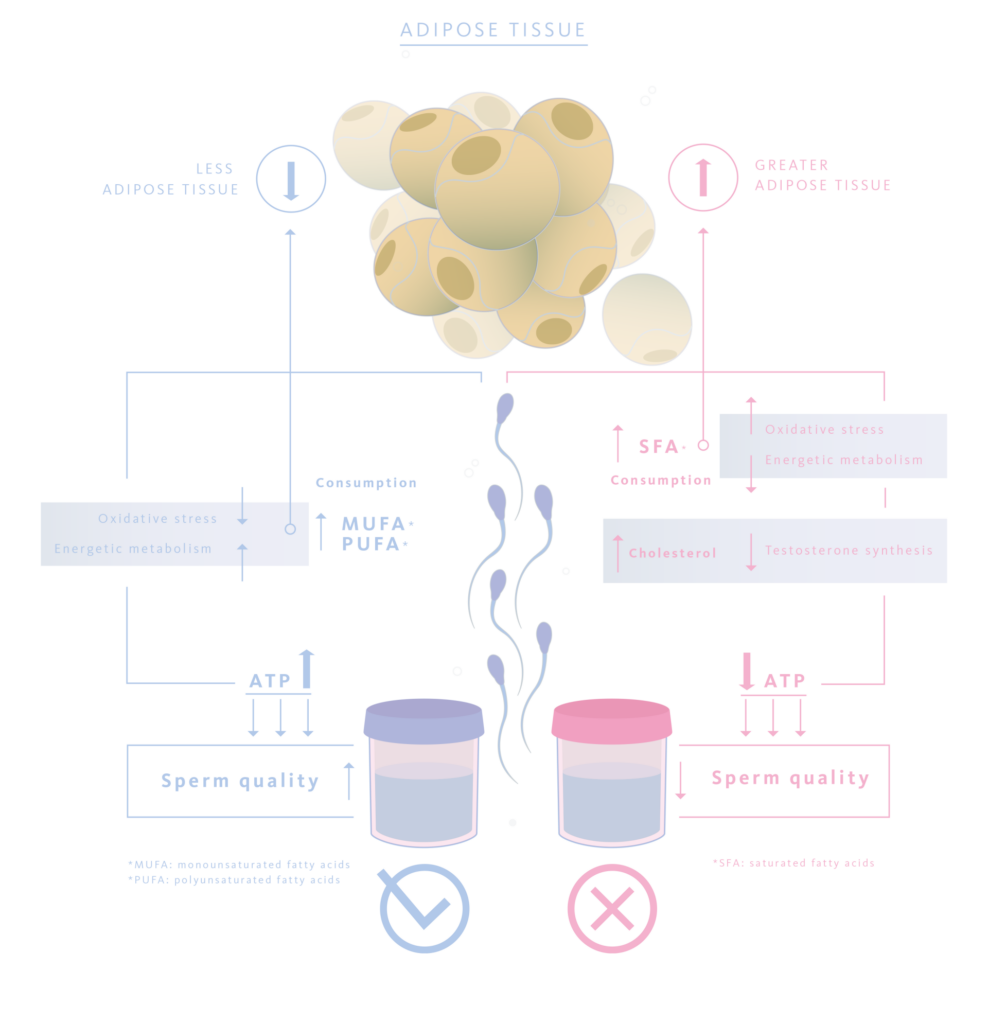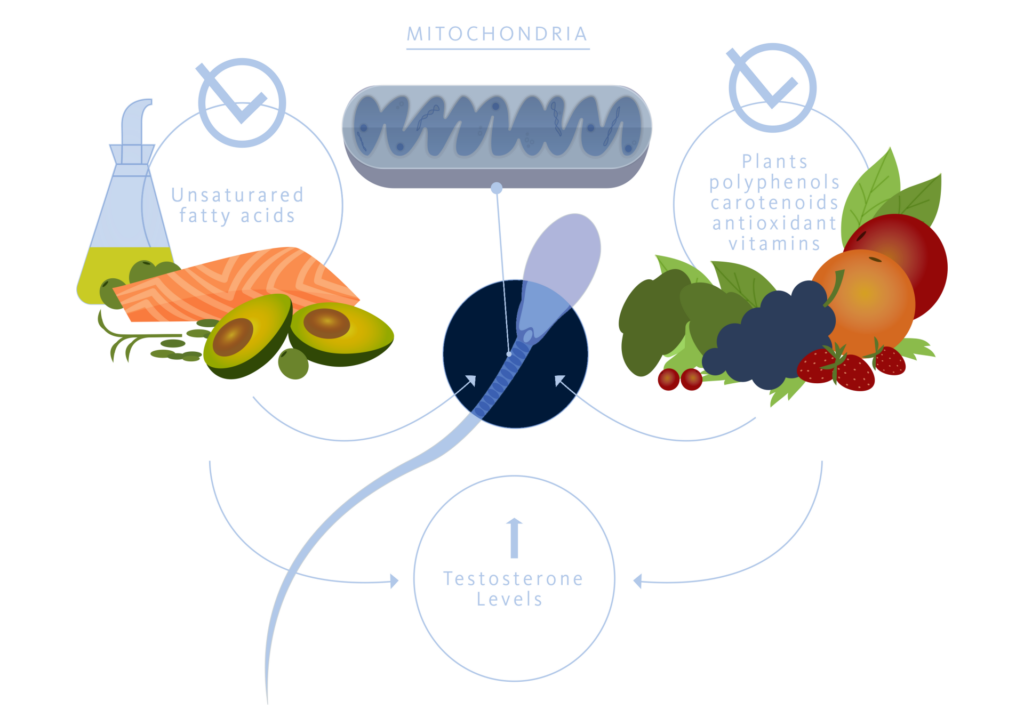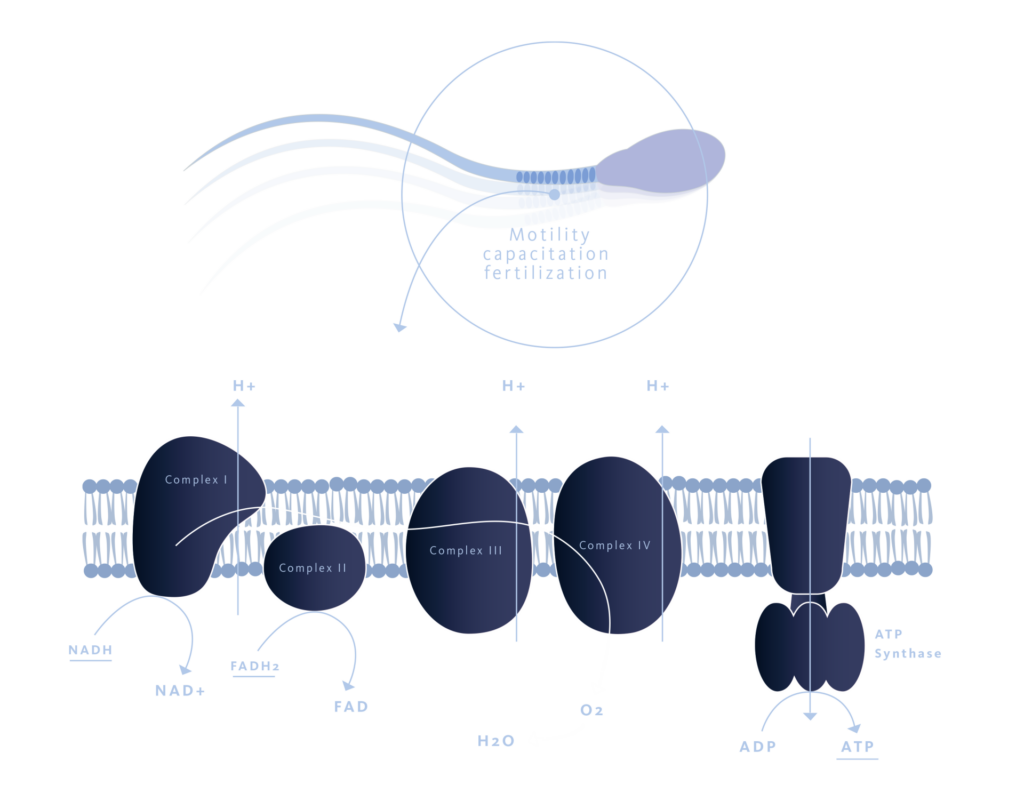We know that diet is a factor that influences a multitude of parameters. Recently, it has been shown that what we eat can affect sperm quality and, therefore, male fertility. An adequate intake of antioxidants appears to be effective in preventing and improving infertility treatments, improving pregnancy rates by 11% to 41% (Suliga E, 2018). However, the effectiveness of different antioxidants in improving quality remains unclear.
How do antioxidants affect semen quality?
For decades, several studies have demonstrated the importance of antioxidants in sperm protection.
Oxidative stress produced by reactive oxygen species (ROS) during spermatogenesis plays a key role in the decline in semen quality, associated with subfertility in 30% to 80% of cases.
Excessive ROS generation has been studied as a cause of sperm damage during the freezing and thawing process. A recent meta-analysis showed that antioxidants also improved the impact on sperm motility when semen samples underwent this process.
Reviews on the topic have concluded that a variety of antioxidants improve sperm quality in subfertile men, thereby improving clinical pregnancy rates.
In a review published in 2021, the effect of eight antioxidants (folic acid, zinc, vitamin E, carnitine, selenium, coenzyme
Q10, N-acetylcysteine, and vitamin C9) was evaluated. Three of them were identified as potentially involved in protection against oxidative stress and improved semen quality, showing statistically significant differences (CoQ10, L-carnitine, vitamin C).
The results showed that:
- Sperm concentration improved with antioxidants such as CoQ10, selenium, and N-acetylcysteine.
- Sperm motility also showed statistically significant improvements with carnitine, CoQ10, vitamin C, and N-acetylcysteine.
- Sperm morphology showed improvements when supplemented with vitamin C, CoQ10, selenium, and N-acetylcysteine.
What role do these antioxidants play?
CoQ10, a fat-soluble antioxidant with the ability to inhibit the oxidation of cell membranes and lipoproteins. The sperm plasma membrane contains a high concentration of PUFAs (polyunsaturated fatty acids) and is highly susceptible to damage induced by excessive ROS concentrations. Therefore, CoQ10 acts by reducing ROS-induced lipid peroxidation in the testes, thereby restoring the innate antioxidant machinery and maintaining testicular function. Furthermore, CoQ10 is a component of the energy metabolism of the respiratory chain and is highly expressed in the mitochondria of the midpiece of sperm. Since spermatogenesis is a complex biochemical process, the effect of CoQ10 may play a broader role in energy metabolism.
Carnitine in human tissues is primarily supplied exogenously (through the diet). The concentration of L-carnitine in the epididymis is higher than that found in the body’s circulation. The epididymis is the primary site of sperm maturation, and the main energy source in epididymal sperm metabolism is the oxidation of fatty acids from L-carnitine. This molecule can eliminate superoxide hydrogen anions, thus preventing lipid peroxidation, and facilitates the transport of long-chain fatty acids into the mitochondria to provide energy to the cell.
Vitamin C can neutralize free radicals, suppressing endogenous oxidative damage. In seminal plasma, the concentration of vitamin C is up to 10 times higher than in blood. Furthermore, an inverse correlation has been shown between the proportion of normal sperm and sperm DNA fragmentation (caused by free radicals). Vitamin C regulates ROS production through the action of mitochondrial enzymes, improving the testicular environment.

Conclusions
Oral antioxidants have demonstrated high safety and bioavailability. Following a balanced diet, such as a Mediterranean diet, appears to have positive effects on semen parameters. (Ferramosca A, 2022).
Some foods, such as peanuts, seeds, berries, tomatoes, oranges, lemons, pomegranates, grapes, mangoes, and papayas, have been shown to regulate ROS and oxidative stress, improving cellular energy metabolism and, consequently, improving certain semen parameters.
Similarly, studies show that a diet high in red meat, saturated fatty acids, caffeine, alcohol, sugars, etc., is associated with worse semen parameters. (Ferramosca A, 2022). Obesity, in turn, has been shown to be a potential risk factor for the development of semen.


References
- Ferramosca A, Zara V. Diet and Male Fertility: The Impact of Nutrients and Antioxidants on Sperm Energetic Metabolism. Int J Mol Sci. 2022 Feb 25;23(5):2542. doi: 10.3390/ijms23052542. PMID: 35269682; PMCID: PMC8910394.
- Su L, Qu H, Cao Y, Zhu J, Zhang SZ, Wu J, Jiao YZ. Effect of Antioxidants on Sperm Quality Parameters in Subfertile Men: A Systematic Review and Network Meta-Analysis of Randomized Controlled Trials. Adv Nutr. 2022 Mar;13(2):586-594. doi: 10.1093/advances/nmab127. Epub 2023 Feb 10. PMID: 34694345; PMCID: PMC8970840.
- Nassan FL, Chavarro JE, Tanrikut C. Diet and men’s fertility: does diet affect sperm quality? Fertil Steril. 2018 Sep;110(4):570-577. doi: 10.1016/j.fertnstert.2018.05.025. PMID: 30196939.
- Suliga E, Głuszek S. The relationship between diet, energy balance and fertility in men. Int J Vitam Nutr Res. 2020 Oct;90(5-6):514-526. doi: 10.1024/0300-9831/a000577. Epub 2019 Apr 10. PMID: 30967104.
